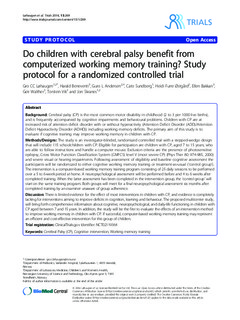| dc.contributor.author | Løhaugen, Gro | |
| dc.contributor.author | Beneventi, Harald | |
| dc.contributor.author | Andersen, Guro Lillemoen | |
| dc.contributor.author | Sundberg, Cato | |
| dc.contributor.author | Østgård, Heidi Furre | |
| dc.contributor.author | Bakkan, Ellen Elise | |
| dc.contributor.author | Walther, Geir | |
| dc.contributor.author | Vik, Torstein | |
| dc.contributor.author | Skranes, Jon Sverre | |
| dc.date.accessioned | 2018-03-02T14:06:03Z | |
| dc.date.available | 2018-03-02T14:06:03Z | |
| dc.date.created | 2014-08-25T12:47:03Z | |
| dc.date.issued | 2014 | |
| dc.identifier.citation | Trials. 2014, 12:269. | nb_NO |
| dc.identifier.issn | 1745-6215 | |
| dc.identifier.uri | http://hdl.handle.net/11250/2488383 | |
| dc.description.abstract | Background
Cerebral palsy (CP) is the most common motor disability in childhood (2 to 3 per 1000 live births), and is frequently accompanied by cognitive impairments and behavioural problems. Children with CP are at increased risk of attention deficit disorder with or without hyperactivity (Attention Deficit Disorder (ADD)/Attention Deficit Hyperactivity Disorder (ADHD)) including working memory deficits. The primary aim of this study is to evaluate if cognitive training may improve working memory in children with CP.
Methods/Designs
The study is an investigator-blinded, randomized controlled trial with a stepped-wedge design that will include 115 schoolchildren with CP. Eligible for participation are children with CP, aged 7 to 15 years, who are able to follow instructions and handle a computer mouse. Exclusion criteria are the presence of photosensitive epilepsy, Gross Motor Function Classification System (GMFCS) level V (most severe CP) (Phys Ther 80: 974-985, 2000) and severe visual or hearing impairments. Following assessment of eligibility and baseline cognitive assessment the participants will be randomized to either cognitive working memory training or treatment-as-usual (‘control group’). The intervention is a computer-based working memory training program consisting of 25 daily sessions to be performed over a 5 to 6-week period at home. A neuropsychological assessment will be performed before and 4 to 6 weeks after completed training. When the latter assessment has been completed in the intervention group, the ‘control group’ will start on the same training program. Both groups will meet for a final neuropsychological assessment six months after completed training by an examiner unaware of group adherence.
Discussion
There is limited evidence for the effect of most interventions in children with CP, and evidence is completely lacking for interventions aiming to improve deficits in cognition, learning and behaviour. The proposed multicenter study, will bring forth comprehensive information about cognitive, neuropsychological, and daily-life functioning in children with CP aged between 7 and 15 years. In addition, the study will be the first to evaluate the effects of an intervention method to improve working memory in children with CP. If successful, computer-based working memory training may represent an efficient and cost-effective intervention for this group of children. | nb_NO |
| dc.language.iso | eng | nb_NO |
| dc.publisher | BioMed Central | nb_NO |
| dc.rights | Navngivelse 4.0 Internasjonal | * |
| dc.rights.uri | http://creativecommons.org/licenses/by/4.0/deed.no | * |
| dc.title | Do children with cerebral palsy benefit from computerized working memory training? Study protocol for a randomized controlled trial | nb_NO |
| dc.type | Journal article | nb_NO |
| dc.type | Peer reviewed | nb_NO |
| dc.description.version | publishedVersion | nb_NO |
| dc.source.volume | 15 | nb_NO |
| dc.source.journal | Trials | nb_NO |
| dc.source.issue | 1 | nb_NO |
| dc.identifier.doi | 10.1186/1745-6215-15-269 | |
| dc.identifier.cristin | 1149128 | |
| dc.description.localcode | © 2014 Løhaugen et al.; licensee BioMed Central Ltd. This is an Open Access article distributed under the terms of the Creative Commons Attribution License (http://creativecommons.org/licenses/by/4.0), which permits unrestricted use, distribution, and reproduction in any medium, provided the original work is properly credited. The Creative Commons Public Domain Dedication waiver (http://creativecommons.org/publicdomain/zero/1.0/) applies to the data made available in this article, unless otherwise stated. | nb_NO |
| cristin.unitcode | 194,65,15,0 | |
| cristin.unitname | Institutt for klinisk og molekylær medisin | |
| cristin.ispublished | true | |
| cristin.fulltext | original | |
| cristin.qualitycode | 1 | |

